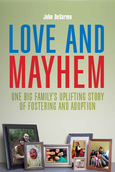
My family grew by two more children last month, bringing our total to six children, both biological and adoptive. Our two newest come to us through adoption from foster care, as did another of ours several years ago. One of the joys I have found is that with all six of my children, I see no difference in skin color and no difference between biological and adoptive. My love for them is equally the same, and equally as strong.
Of the over 560,000 children placed in foster care in 2010, it is estimated that 107,000 of these foster children became eligible for adoption. Sadly, only around 53,000 of these children were adopted during that year, with over half of these children being adopted by foster parents, with the rest being adopted by family members, and a small percentage being adopted by non relatives. For those children who are not adopted, many remain in the foster care system for extended periods of time. Some of these children are moved to group homes, while others simply age out of the foster care system, never truly finding a family of their own and a place to call home. Indeed, currently there are roughly 126,000 children in foster care who are ready for a forever home, an adoption home.
I certainly did not set out and plan on adopting these three children from foster care. Indeed, over the 12 years I have been afoster parent, I have had over four dozen children come through my home, and only three were adopted. In truth, my wife and I tried to adopt another foster child, but sadly, it did not come to pass, leaving all grief stricken and upset.
Join the thousands who receive Dr. DeGarmo's FREE foster care newsletter. Simply fill out the form below.
Like I did four years ago when we adopted our first from foster care, I once again broke down in tears in the court house when the adoption pages were signed, due to the overwhelming joy I felt. For these two girls, our home has been the only stable home they knew, as one child came to us at only a little over a year old, and the other when she was just 27 hours old. For both, my family has been the only true family in their young lives, making the adoption process an easier one for all involved.
There are those time, though when adoption can be an emotionally difficult time for a foster child. No longer will the child be able to hope for possible reunification with his biological parents, or even with other membersof his birth family. Instead, the termination of rights by his birth parents might produce feelings of grief and loss within him, fears he had kept bottled within himself during the length of his stay in foster care. He may even feel that he has betrayed his biological family as he legally takes the adoptive parents’ last name, as well as becoming a permanent member of the family. You may find that the child revisits the stages of grief again, both during and after the adoption process. Indeed, it can be an emotionally traumatic time for adults and children.
The adoption of three girls into my home has taught me much, and has filled my home with more laughter, more tears,and more learning experiences than I would ever have imagined. To be sure, there are challenges involved, particularly the fact that all three children come from our small town of just over 2,000 residents, and we do not know who any of the birth fathers truly are. Yet, these challenges are far outweighed by the gifts of love each bringsto our home and to our lives. We continue to foster children in need, and continue to love each biological,adoptive, and foster child with as much unconditional love as possible. Each child is unique, each child is special,and each child is deserving of such love.
-Dr. John DeGarmo
For more on Dr. John's adoption story of three children from foster care, buy his NEW book Love and Mayhem: One Big Family's Uplifting Story of Fostering and Adoption. Get your SIGNED copy HERE.


 RSS Feed
RSS Feed